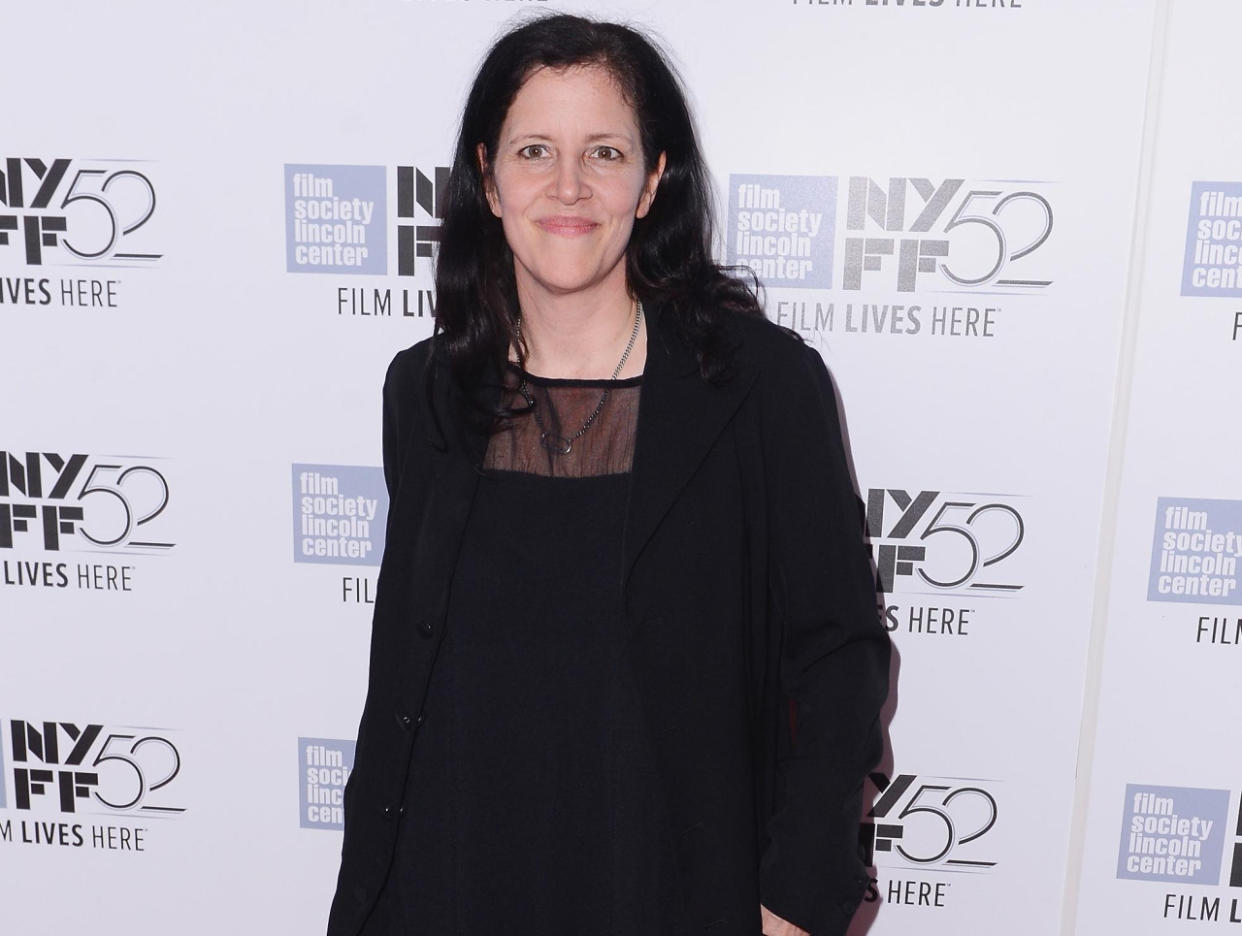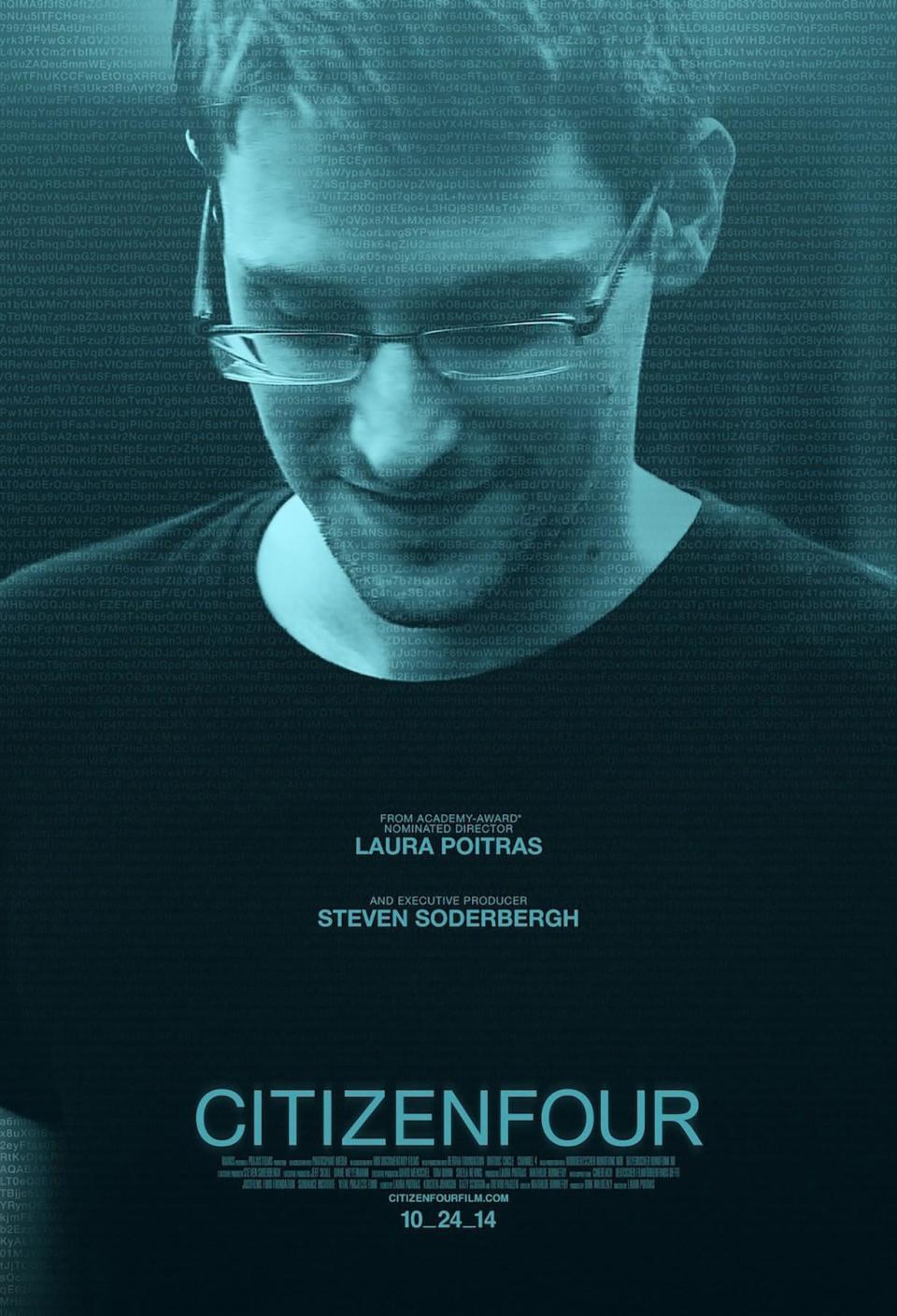'Citizenfour' Director Laura Poitras Takes Us Inside Edward Snowden's Hotel Room

‘Citizenfour’ director Laura Poitras at this year’s New York Film Festival
Laura Poitras is calling from her cell phone, which means that there’s a chance the NSA is collecting data about our call, or perhaps even listening in on our conversation. Of course, it was her groundbreaking reporting that helped expose the fact that the U.S. government could be tapping into anyone’s phone calls, but the threat is certainly heightened any time the 52-year-old documentarian is involved.
Poitras is the director of the upcoming film Citizenfour,which provides a remarkable window into the process by which a former NSA contractor named Edward Snowden leaked a motherlode of top-secret documents detailing the government’s massive spying on its own citizens’ phone data and web browsing.
Snowden first contacted Poitras in early 2013, using a pseudonym that the director borrowed for the title of the film. He promised that he had stunning evidence of the domestic spying program’s reach, prompting months of encrypted emails. Ultimately, Poitras enlisted journalist Glenn Greenwald and flew with him to Hong Kong, where they met Snowden in a hotel room to look over the story he had promised.
The 29-year-old delivered, and the filmmaker and journalist worked with Snowden for a week to prepare the bombshell documents into stories that would shock the world.
Poitras, already on a government watch list thanks to previous films that included 2010’s The Oath and 2003’s Flag Wars, has become an outspoken privacy advocate. She hopes that Citizenfour — opening in selected theaters on Oct. 24 —will open America’ eyes about what its government is doing.
The filmmaker spoke with Yahoo Movies earlier this week about the experience of making Citizenfour, the status of Edward Snowden, and the American attitude toward government snooping.
What are the chances that we’re being sucked up by the vast machine of the NSA?
Right now, I happen to be calling from my personal cell phone, which probably increases the likelihood. But I am calling from within the United States. If I was in Berlin [where she now resides], on my phone, the chances are pretty high.
You’ve flown to New York this year without a problem. Do you think it’s because you now have a high profile, and it’d be more trouble than it’s worth for the feds to stop you?
In my case, I was on this watch list for years, I assume I’m still on it even though they don’t stop me anymore. But what was happening with that, was they’d question me as to where I’d been, and photocopy my notes. For them to do that now, would be a story. Either they have to be ready with subpoenas or something — or worse — or they just have to let us go, because there would be some blowback if they started trying to photocopy my notebooks now.
If Snowden had tried to remain anonymous, I think the likelihood of us being subpoenaed would have gone up substantially. But the fact that he’s come out and said, “Hey, this is who I am and this is why I did it,” puts the government in a more awkward position if they wanted to try to subpoena us.
Did the government know that Snowden had left right away? What was the danger at that moment since the government didn’t yet know that he was the leaker?
I think there was a lot [of danger]. We know that they pay attention to flight manifests and typically, when you work for these agencies — for the NSA or other intelligence agencies — you’re supposed to request permission for international travel, which didn’t happen in this case. So I assume it was known that he had traveled, and I don’t know if they started to question. But it was clear, on the day that Glenn [Greenwald] published the Verizon story [his initial story in the U.K.’s Guardian on NSA’s domestic spying], was the day Lindsay Mills [Snowden’s girlfriend] got a knock on her door from the NSA asking where he is, and my guess is that it wasn’t the Verizon story that triggered that.
If you have one person who works for the NSA getting on a plane to Hong Kong, and you have three journalists doing it three days later, I think there was some questioning, some speculation about why we were all in the same place.

Watching him in that hotel room, I thought, did he ever order a movie or something? Was he only thinking of the NSA at that moment?
I didn’t see him do that. And from my perspective, I’ve been thinking about the NSA, somehow when I wake up in the morning and when I go to bed at night, somehow the NSA is on my mind, so certainly I haven’t had that much distraction from it, so I’m sure he hasn’t had that much.
You edited this movie in Berlin, did you ever have trouble getting footage from point A to point B?
We took some precautions in securing the footage. Everyone was on encryption, we would physically deliver drives, when we were showing cuts in the U.S., they were put in encrypted containers with shared passwords that were given in person, and even those cuts that we shared, we had redacted sections in them, so that some of our distributors and funders didn’t see the final film until right before we premiered it.
So we were very careful about what footage and who was able to see the film, what they were able to see, and we made people take their cell phones out of the rooms, we did screenings. As we got [closer to final cut], then the risks were minimized. It’s the same with Edward and the news stories, there is a point at which you’re very close to publication and it’s all going to be public anyway, so if the necessary redactions are done, the risks are not as bad as when you’re looking at documents that aren’t redacted yet.
Related: Watch the First Meeting With NSA Leaker Edward Snowden in the Trailer for ‘Citizenfour’
At the end of the movie, we see Glenn Greenwald talking about a new source who has a bombshell to drop. When will that be revealed?
There is ongoing reporting — I’m not going into lots of details about it — but there’s ongoing reporting that will unfold in its own timeframe. We released what we could at this point. It’s not like we’re doing a coordinated dance like we’re withholding something because of the film. The reporting takes time and it will come out when we can. Jeremy Scahill and Ryan Devereaux from The Intercept have been doing most of the reporting and they have also reported on this watch list document in the written notes.
So what’s next for Edward Snowden?
I wouldn’t be surprised if another country were to come forward and offer asylum. He did apply to many countries, and so I wouldn’t be surprised if there’s a third country that came forward to provide asylum. But I’m not in the loop. I know his lawyers — Ben Wisener of the ACLU and Wolfgang Kaleck, who is based in Berlin — they’re people I stay in touch with, but I don’t know the legal ins and outs.
It’s interesting that it’s in Russia, which has its own governmental issues. Does he have any issues with that?
The course of events were that he was transiting through Moscow and his passport was revoked. So he was abandoned. What the State Department ultimately did, was they didn’t give him a lot of options. He was stranded there and ended up applying, I don’t think it was intention to end up there — actually I know it wasn’t — but I also felt that he felt strongly that he was going to seek political asylum because there wasn’t a way that there would be a possibility for a fair trial for someone who releases this information. And what we’ve seen of the Espionage Act, in other cases, he was right to think that.
Are Americans willing to give up their privacy more than you expected?
I don’t think people are really that willing to sacrifice their freedom. If the government said, “We want the passwords to all of your email accounts” or “We want to remotely turn on the cameras on all of your laptops,” I think most people would say, “No, that’s totally unacceptable.” I think people really do care about privacy. I think it’s a fundamental, core right and value that everybody has. It’s a question of when do people feel that [privacy] is violated? And so, yes, for sure, some people are more sensitive to it.
Once you feel that line has been crossed or violated, most people would resist the government doing that. And yeah, of course, in the post-9/11 era, fear is used to justify all kinds of encroachments of basic civil liberties, and it’s been really tragic to watch that unfold.
Want to see Citizenfour? Visit our Showtimes page to get tickets.
Photo credits: @Getty Images, @Everett Collection

